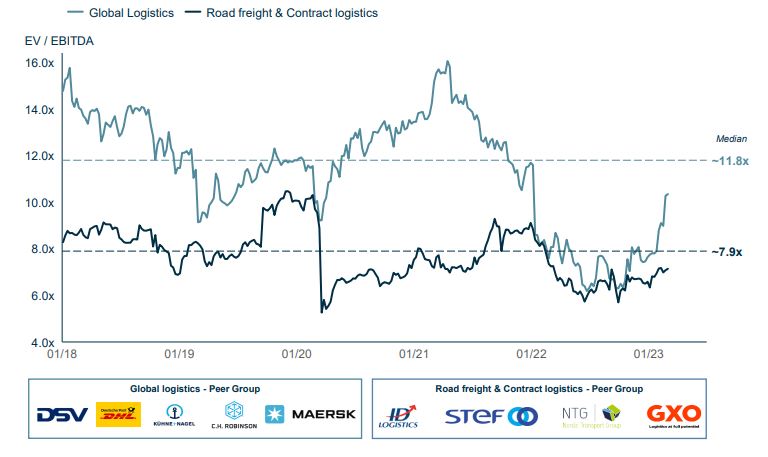M&A Logistics Insights: Industry Report – Spring 2023
The logistics sector has undergone tremendous development over the last four years. Once viewed primarily as a commodity service, logistics has seen a significant revaluation, now recognized as an essential service. This shift is highlighted by the increase in private equity-related transactions within the sector. We anticipate this positive trend will persist in the years ahead, making it crucial for every entrepreneur to understand how to leverage this development to their advantage.
The European logistics market continues to exhibit significant fragmentation, despite a decade of efforts aimed at consolidation, primarily by European firms seeking to enhance their global presence. For years, the value of the logistics sector was underestimated. However, the recent disruptions in global supply chains have profoundly altered this perception. Nowadays, the capability to offer comprehensive, global logistics solutions with substantial visibility is acknowledged as a key differentiator for leading firms. This transformation has attracted the attention of private equity investors, who have ventured into the market, initiating the creation of logistics conglomerates at both European and global levels capable of high-level competition.
In most instances, these ventures follow a strategic buy-and-build approach, generating value through the arbitrage of buying and selling multiples as well as through the consolidation and optimization of administrative operations. For entrepreneurs and family-owned businesses contemplating ownership transition, selling (fully or partially) to a private equity investor presents an opportunity to not only cash out and diversify their personal wealth but also to further grow the company. This partnership with an investor is based on a clear and defined growth strategy, aiming to scale the business effectively.
M&A Development in the European Logistics Market
2018 – 2022

Source: (1) MergerMarket, MCF analysis
M&A Strategies
Key to a successful and value-maximizing transaction is understanding the diverse strategic perspectives within the potential buyer universe. Strategic buyers are mainly in search of opportunities to cross-sell their offerings to additional services and (adjacent) international markets, or to enhance the density of their network. On the other hand, financial investors can be categorized into two types: private equity investors, who focus on building groups with a distinct Unique Selling Proposition (USP), and infrastructure investors, who aim to support the company’s growth organically by entering new locations through investments into warehouses or logistics hubs.
Grasping the strategic focus of these buyers is crucial as it allows for the customization of the equity story to suit individual buyer profiles, thereby maximizing valuation. Tailoring the narrative in this manner not only highlights the unique value proposition of the company but also aligns it with the specific growth strategies and investment criteria of potential buyers, making the opportunity more attractive and potentially leading to a more favorable transaction outcome.
Buy and Build
The strong fragmentation of the logistics market allows for significant consolidation. Realizing an arbitrage between acquisition and exit multiples generates enormous value for the investor.
Infrastructure-backed
The asset-heavy business model by growing through newly build warehouses makes the logistics market interesting to infrastructure funds, who are willing to commit capital for future investments.
Diversification
Diversifying the service offering to allow for one-stop shop solutions and cross-selling boosted M&A activity in recent years – especially with maritime shipping businesses entering land and air-freight.
New Geographies
Entering new geographic markets to enhance the value chain and participate from the entire transportation journey.
Valuation Environment
The valuation environment in the logistics sector has been very volatile over the last three years. With the market turmoil caused by Covid19 and the subsequent disruptions in the value chain, multiples have been heavily influenced by the extraordinary increase and volatility in global freight rates. With the freight rates coming back to their pre-covid level, valuations are reaching a sustainable level as well. The wider the service offering and global reach, the higher are the valuation levels. This is underlined by multiples of comparable transactions, in which deals exceeding a valuation level of EUR 1bn are fetching EV / EBITDA multiples in between 10-15x, while smaller transactions are being valued in the range of 7-10x EV / EBITDA.
Selected comparable publicly listed companies

Source: CapitalIQ, MCF analysis
Trends Impacting M&A
Near-shoring
Global supply chain disruptions have shown the vulnerability of a globalised world and the dependence on Asian markets. As a result, near-shoring becomes increasingly important. A strong access to the markets in CEE will be key to benefit from this development – either through own locations or supply chain networks.
ESG Conformity
The increased awareness of an ESG compliant supply chain has set new requirements for logistic providers and offers opportunities and risks at the same time. Having a dense network of hubs, either through own locations or with the help of a network, as well as investments into a modern, green fleet and energy efficient warehouses will be key differentiators.
China + 1
Companies shift their supply chains away from China to other countries in Southeast Asia, to diversify their supply chains and reduce their dependence on China. This trend has been driven by rising labor costs in China, increased competition, trade tensions between China and other countries, and supply chain disruptions caused by the COVID-19 pandemic.
Digital Transparency
The use of technology to increase visibility and accountability in the supply chain process involves the implementation of digital systems providing real-time data on location, status and progress of shipments, enabling all stakeholders to have a clear understanding of the delivery process to benefit customers experience, reduce risks of delays and loss, and increased efficiency and cost savings.
Get in touch
To view the full report including case studies of recent transaction in the logisitcs sector please download the full report.
If you have any questions or would like to discuss your business please get in touch with one of our team.
About us
The MCF logistics team have successfully advised clients on both sell-side and buy-side transactions. As proven by our previous mandates, the team has developed sophisticated sector expertise and established an excellent logistics industry network. Our deep industry knowledge is driven by the
strength of our relationships with key market players across Northern Europe and internationally, also via our partnership with D.A. Davidson in North America.
Get in touch





